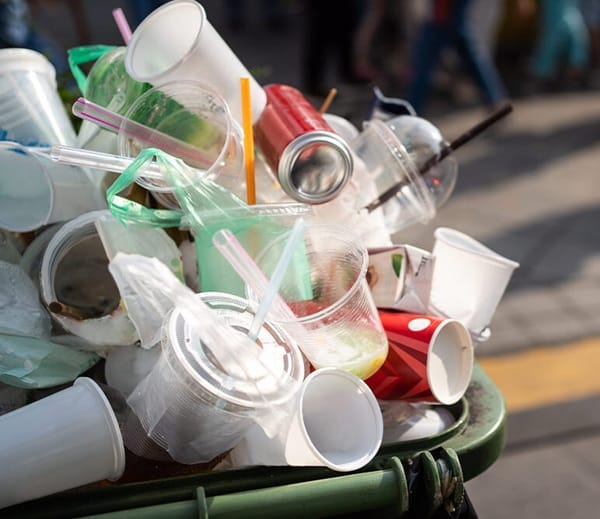Table of Contents
The Hidden Crisis: Plastic, Paper & Food Waste in Restaurants and Parties
In an era where sustainability is no longer optional but essential, the hospitality and foodservice industries—especially restaurants, cafes, and large-scale event venues—remain major contributors to one of the most alarming and complex forms of waste: mixed plastic, paper, and food waste. This type of waste is often overlooked because it’s normalized. From the iced coffee in a plastic cup with a paper straw to disposable plates used at weddings and corporate dinners, the remnants of our convenience culture are piling up—literally and figuratively.
The Single-Use Trap
Let’s start with a familiar scene: you walk into a café, order your coffee “for here,” and are handed a disposable plastic cup, paper sleeve, and a plastic lid—despite the presence of ceramic mugs and a commercial dishwasher behind the counter.

This scenario plays out thousands of times each day. Restaurants, hotels, and event venues default to disposables for perceived convenience, hygiene concerns, or cost-efficiency. The outcome? Mountains of plastic-lined paper plates, coated cups, plastic utensils, and food scraps, all tossed into the same trash bin.
Why Mixed Waste Is a Major Problem
Most people think waste gets “recycled,” but the truth is:
Anything contaminated with food is almost never recycled.
When food remnants soak into paper or cling to plastic utensils and cups, they disqualify the item from being recycled. Even compostable containers often end up in landfills because they’re mixed with conventional waste or disposed of in cities without industrial composting systems.
That means:
- Paper plates with food → landfill
- Pizza boxes with grease → landfill
- “Compostable” utensils in a plastic bag → landfill
- Plastic drink cups with coffee residue → landfill
Once it hits the bin, that item will not get sorted. It becomes trash.
Parties, Picnics, Events & Catering: An Overflowing Waste Stream
Events—whether weddings, corporate retreats, picnics, or birthday parties—generate staggering volumes of waste:
- Plastic cups, forks, and spoons
- Paper napkins, plates, and tablecloths
- Uneaten buffet food
- Beverage containers and cocktail garnishes
These events often lack any system of sorting, reuse, or composting. Cleanup crews, operating on tight timelines, throw everything into garbage bags—food scraps, recyclables, and compostables alike—because there’s no infrastructure or incentive to do otherwise.
Reality Check: From Café Tables to Curbside Trash Mountains
The problem doesn’t end indoors. As shown in recent images from Philadelphia, bags of waste overflow city bins and sidewalks due to underfunded sanitation departments, strikes, and poor infrastructure. While frontline sanitation workers go underpaid and undervalued, our society continues to throw away more than the system can handle.
This isn’t just about waste. It’s about:
- Systemic inefficiencies
- Public health risks
- Dignity of waste workers
- Environmental and social justice
But Is It Really the Consumer’s Fault?
Not entirely. Consumers often have no other choice. In many establishments, there is no dine-in alternative to disposable packaging. Composting or recycling stations are nonexistent or unclear. And “green” packaging often misleads customers into thinking they’re doing the right thing.
We need to shift the conversation from guilt to systems.
What Can Be Done?
For Restaurants, Cafés & Venues:
- Offer reusable dine-in options by default
- Install clearly labeled bins for recycling and composting
- Partner with local composting facilities
- Use durable, washable dishware for in-house service
- Educate staff and customers about sustainable waste practices
For Event Planners:
- Prioritize zero-waste planning
- Rent reusable items: plates, glasses, utensils
- Partner with organizations that handle food recovery or surplus donation
- Train catering staff to sort waste during cleanup
For Cities & Governments:
- Fund waste worker wages and support infrastructure
- Require businesses to offer reusable options
- Incentivize reuse models and deposit-return systems
- Ban unnecessary single-use plastics and non-compostable disposables
For Consumers:
- Ask for “for here” options
- Carry a reusable cup or container when possible
- Support businesses with sustainable practices
- Push for better systems and vote for policies that prioritize the planet
Reframing Waste: From Burden to Resource
The mixed waste crisis at restaurants and events isn’t just a trash problem—it’s a systems failure. But every crisis is an opportunity. We can redesign the way we serve, eat, and clean up by aligning incentives, infrastructure, and behaviors.
Let’s stop seeing waste as something to hide and bury. Let’s start seeing it as something to rethink, reduce, and responsibly manage. Because the future of food service isn’t just what we serve on the plate—it’s what happens after the last bite.
Food Pulse : Empowering sustainable food systems, one meal—and one bin—at a time.





